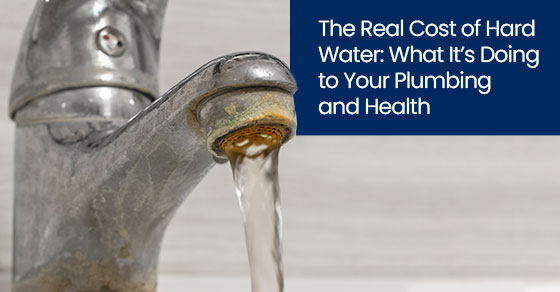 19
Aug 2025
19
Aug 2025
The Real Cost of Hard Water: What It’s Doing to Your Plumbing and Health
You might not notice hard water until it becomes annoying. Soap that doesn’t lather. Glasses that come out cloudy. That faint crust building up around your showerhead that never really goes away.
But these aren’t just surface-level quirks. Hard water quietly works its way into your home’s plumbing, messing with everything from your water heater to your skin.
The worst part is that most people don’t realize there’s a problem until something breaks.
Hard Water Explained
Let’s get one thing straight: hard water isn’t dirty. It’s not “bad” water. It just has too much calcium and magnesium dissolved in it. Totally natural, especially in places like Toronto, where groundwater runs through mineral-heavy layers.
But those minerals don’t stay dissolved forever. Over time, they cling to the inside of your pipes and fixtures. Not in dramatic ways, either. You won’t wake up to an explosion of white flakes. You’ll just slowly notice showers feeling weaker, faucets gurgling when they didn’t before, your kettle working overtime, and that “clean” feeling not quite landing after a shower. Small changes. But they’re stacking up.
What Hard Water Actually Does to Your Plumbing
Plumbing systems were built to move water, not scrape rock out of themselves.
As those minerals settle inside your pipes, they form scale, layer after layer of it. The buildup narrows the pipes, strains valves, and turns once-efficient appliances into clunky energy hogs. It’s similar to how cholesterol can clog arteries. Scale builds up and slows everything down.
Over time, this leads to lower water pressure (especially in older homes), hot water tanks struggling to heat effectively, mineral-packed clogs in showerheads and faucet aerators, appliances giving out early, and increased likelihood of leaks or even burst pipes in corroded sections.
The real kicker? Most of this happens quietly, without obvious symptoms, until something expensive fails.
How Hard Water Affects Your Skin and Hair
It’s not just your pipes that get clogged. Your skin and hair catch the fallout, too.
Ever step out of the shower feeling like there’s still something on you? That’s hard water, leaving a film that traps soap residue and dries your skin out. For some people, it’s just annoying. For others, especially those with eczema, psoriasis, or sensitive skin, it’s a trigger.
People living with hard water often share a familiar list of frustrations. For starters, skin tends to feel tight, itchy, or flaky after bathing, as if soap is still clinging to the surface. Hair can be stubborn to rinse and often ends up looking dull or feeling weighed down. Laundry becomes another pain point.
Clothes fade more quickly, come out of the wash feeling stiff, and never quite smell or feel truly clean. And then there’s the cost of compensating. Many households use more detergent or shampoo to combat the effects, yet still don’t see the clean or softness they’re aiming for.
And the irony? You end up spending more on “fixes” like lotions, conditioners, and fabric softeners when the real problem is in your water.
Why a Water Softener Matters
A lot of water softener ads make it sound like you’re buying luxury. Silky hair. Perfect showers. Sparkling glassware. That’s great. But that’s not why most homeowners end up getting one.
They do it because of the slow, expensive damage they didn’t see coming.
A water softener removes excess calcium and magnesium before they get to your pipes. No scale. No invisible erosion. No crusty hardware. It’s not magic. It’s just filtration done early enough to matter.
In practical terms, installing a water softener can extend the life of your water heater, dishwasher, and laundry machines by preventing mineral buildup. It means you won’t have to constantly scrub white scale off your faucets and fixtures. Water pressure remains more consistent because the pipes aren’t getting slowly choked by scale.
People with sensitive skin often experience fewer flare-ups after showering, and since softened water lathers more effectively, you end up using less soap, shampoo, and detergent overall. If you live in a neighbourhood known for hard water, a softener isn’t a nice-to-have. It’s a protective measure that saves you money and stress in the long run.
Protect Your Plumbing From Hard Water
Hard water might not scream for your attention, but the signs are there if you know where to look. From weakening water pressure to stubborn scale around your taps, it’s a slow, steady warning that your plumbing is under pressure.
Left unchecked, the damage builds. Repairs become replacements. Cleanups become costly. But a water softener installed at the right time can prevent the worst and preserve your plumbing.
At Brothers Plumbing, we’ve seen firsthand what early action can save. We’ll inspect your system, identify signs of hard water stress, and offer honest, practical solutions to protect your home. Give us a call at 647-247-2230 or click here to reach out online. A simple upgrade now could save you thousands down the line.